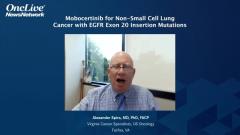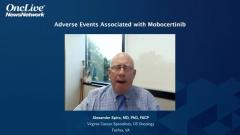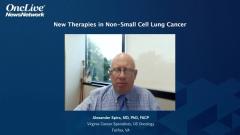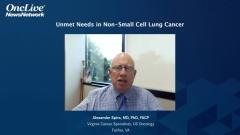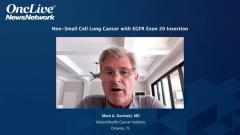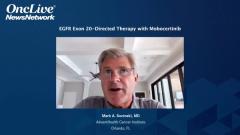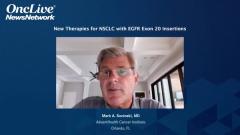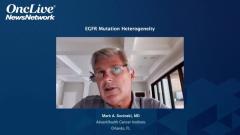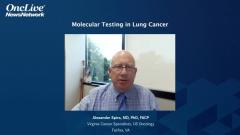
New Therapies in Non–Small Cell Lung Cancer
Alexander Spira, MD, PhD, FACP, highlights emerging targeted agents to treat non–small cell lung cancer with actionable mutations.
Episodes in this series

Alexander Spira, MD, PhD, FACP: This is going to be a plethora of riches where we have multiple new targeted therapies for exon 20 insertions. We’ll have amivantamab, and we’ll have, hopefully mobocertinib, both initially approved in the second-line setting, at least that’s my understanding for mobocertinib, as of this time. Most of us would recommend using them in the second-line setting; in the first-line setting, they’re not approved. And given the high response rates of chemotherapy, most are probably recommending that first. There are a lot of clinical studies right now looking at this in the first-line setting, combining with chemotherapy, combining with other drugs, and we look forward to figuring out what their long-term role is going to be. Meaning, how are these ultimately going to be placed? There are some other new drugs being developed at this juncture as well. There’s a drug called CLN-081; there’s a drug called DZD9008. Poziotinib has had its ups and downs over the years, but it’s in study as well. They had a lot of issues of toxicity with that, but it appears to be a little better on a different dosing regimen.
We’re all going to use both amivantamab, and hopefully mobocertinib when it is approved as expected, in the second-line setting, but looking toward how do we move these up into the frontline setting? It’s super important that we remind everybody to test, test early, and test often. Meaning you can’t treat somebody with a targeted therapy if you don’t test for that targeted therapy. Please test for all these mutations. If you don’t know what to do, ask a friend, ask a colleague, ask somebody. It’s hard for me, even as a lung cancer specialist, to delve down here because these are not that common. And there are a lot of rare mutations, so it’s super important to know and ask, and certainly test everybody. Tissue’s the gold standard, blood is a close second, but either one, if not both, is appropriate.
The important thing about these less common EGFR mutations, again, is to test, and test, and test, and make sure you’re reading those reports. It’s very easy, if you’re not thinking about it, to see EGFR and think osimertinib. Osimertinib is not the answer to this less common group. You need to be able to look at those reports, and as we used to say, phone a friend, ask a colleague, or even ask the people doing the reports what the data are. It will often come on the reports and tell you what the sensitivities are. Please make sure you’re testing everybody for this.
There are a lot of new drugs; there’s an anti-HER3 drug for EGFR. There’s datopotamab, which is a TROP-2 that has activity, being studied there as well. And amivantamab, developed here and approved for exon 20, is also being studied with lestaurtinib, another TKI [tyrosine kinase inhibitor], for standard EGFR mutations, the exon 19 and 21 that are refractory. There’s a lot of study being done in the EGFR mutations here right now. With KRAS, a lot of headway made recently as well. We expect more and more of these drugs to come in the future. One of the first instincts when looking at both mobocertinib and amivantamab is being a little discouraged because the response rates were not as high as some of the other targeted therapies we’ve had, and they’re not. They’re probably not as good, although as I said, this is a very heavily pretreated population, but this is the first go at it. We expect there to be better drugs coming down the pike in the future. Stay tuned.
TRANSCRIPT EDITED FOR CLARITY


